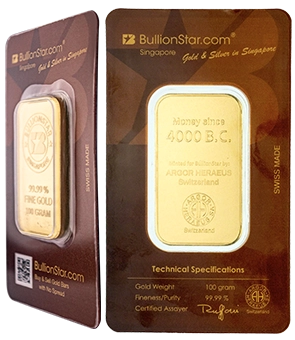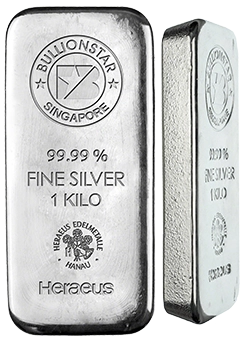U.S. Tees Up 'Stop Russian Gold Act'
When the UK, US and EU moved to introduce financial sector sanctions against Russia during the week of 21 – 25 February, one set of markets notably hesitant to join the fray were the OTC precious metals markets in London and by extension the precious metals futures markets run by the COMEX.
Awaiting Instructions – LBMA and COMEX
While the London Bullion Market Association (LBMA) quietly moved to kick out Russian banks VTB, Sovcombank, and Orkritie from LBMA membership sometime around 24 – 25 February (and without any sort of announcement), the LBMA appeared to be unable to come to a decision about the 6 LBMA-accredited Russian precious metals refineries on the LBMA Good Delivery Lists of Gold and Silver. This was despite the fact that it was completely obvious that the structural nature and operational activities of these Russian refineries broke the LBMA’s own ‘Good Delivery Rules’ in terms of breaching US-UK-EU sanctions.
Specifically, these six Russian refineries are Krastsvetmet, Prioksky, Novosibir, Uralelectromed, Moscow Special Alloys Plant, and Shyolkosky.
Hence the BullionStar article on 28 February titled “LBMA a deer in headlights as Western Sanctions show up Russian Gold Refiners”.
That article also pointed out that every LBMA accredited gold and silver refinery is also on the CME (COMEX) approved brands list (for warranting and delivery), a situation which arose following a CME mass approval in August 2020 of 267 LBMA Good Delivery List gold and silver refineries. Which meant that the 6 Russian precious metals refiners in question were also on the COMEX approved refiner brands list.
As the week beginning 28 February passed, the LBMA’s continued reluctance to be decisive was revealed when on Thursday 3 March Reuters published an article stating that the LBMA claimed it had merely ‘asked’ the 6 Russian refineries in question whether they have commercial links with sanctioned Russian entities, a bizarre situation given that all and sundry, and most of all the LBMA, knows the nature of the Russian gold market, and that of course the Russian refineries have intimate relationships with the sanctioned Russian banks as well as being owned by the Russian state / Russian oligarchs.
Hence the second BullionStar article on the subject dated 4 March, which was titled “LBMA’s Fear of Stoking the Russian Bear – From ETF Concerns to Monetary Mayhem”.
This 4 March article also highlighted the massive number of Russian refinery gold and silver bars held in the world’s largest gold and silver ETFs, including by GLD, SLV and IAU, and also speculated that a move to exclude Russian bars from LBMA Good Delivery accreditation will only accelerate the use of Russian gold in non-Western international trade while being a worst case nightmare for the likes of the US Treasury. As the article concluded:
“For if you ban Russian gold bars in the London market, this would surely accelerate the use of Russian gold as the ultimate currency for non-Western trade, and the deployment and use of this same Russian gold everywhere else in the global market, from Shanghai to Mumbai, from Dubai to Minsk, from Islamabad to Riyadh, from Astana to Sao Paulo and from Pyongyang to Johannesburg.
Maybe that is the LBMA – HM Treasury – US Treasury’s worse case nightmare, and the real reason why the LBMA is stalling.”
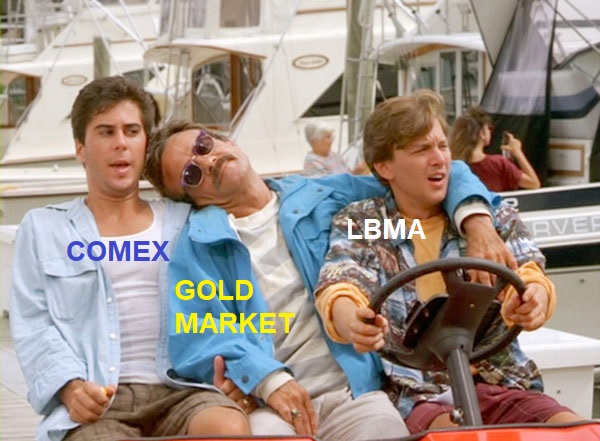
March 7 – Singing from the Same Song Sheet
Then on Monday afternoon (London time) on 7 March, the LBMA finally made a move and announced that it was suspending the 6 LBMA-accredited Russian precious metals refiners from its Good Delivery Lists for gold and silver.
LONDON BULLION MARKET ASSOCIATION SUSPENDS ACCREDITATION OF 6 RUSSIAN GOLD REFINERIES
— *Walter Bloomberg (@DeItaone) March 7, 2022
In a shortly worded news release timestamped (15:33 7 March 2022), titled “Good Delivery List Update: Gold & Silver Russian Refiners Suspended”, the LBMA said that:
“In light of UK/EU/US sanctions and to ensure an orderly market, LBMA has suspended the following gold and silver refiners with immediate effect:
-
-
- JSC Krastsvetmet (gold and silver)
- JSC Novosibirsk Refinery (gold and silver)
- JSC Uralelectromed (gold and silver)
- Moscow Special Alloys Processing Plant (gold)
- Prioksky Plant of Non-Ferrous Metals (gold and silver)
- Shyolkovsky Factory of Secondary Precious Metals, SOE (gold and silver)
-
These six refiners will no longer be accepted as Good Delivery by the London Bullion market until further notice.
Existing Material Remains Good Delivery
Following a suspension or a transfer to the Former List, the bars that the Refiner produced while on the List will still be considered Good Delivery”
A few hours later across the Atlantic Ocean, CME Group, operator of the world’s largest previous metals futures exchange – the COMEX, released (at 2:52 pm NYT) a practically identical statement to that of the LBMA, and which is titled “Suspension of Approved Status for Warranting and Delivery of Certain Gold and Silver Brands”, saying that these same 6 Russian refiners were being suspended from the COMEX approved bar brands list as follows:
“Effective immediately, Commodity Exchange, Inc. (“COMEX”) has suspended the approved status for warranting and delivery of the following brands of gold and silver until further notice.
-
-
- JSC Krastsvetmet (gold and silver)
- JSC Novosibirsk Refinery (gold and silver)
- JSC Uralelectromed (gold and silver)
- Moscow Special Alloys Processing Plant (gold)
- Prioksky Plant of Non-Ferrous Metals (gold and silver)
- Shyolkovsky Factory of Secondary Precious Metals, SOE (gold and silver)”
-
Gold and silver produced prior to March 7, 2022, will continue to be eligible for warranting and delivery. Metal produced as of March 7, 2022 and beyond will not be eligible for warranting and delivery until further notice.
Notice the identical wording of the LBMA and COMEX press releases (“until further notice" “with immediate effect", “effective immediatey", and even the listing sequence of the six refiner names is identical in both cases. So this was definitely a case of coordination between the LBMA and CME/COMEX. LBMA – COMEX collusion, however, is nothing new, as readers of this blog will already know. See for example:
“LBMA colludes with the COMEX – To lockdown the global gold market?” 25 March 2020“
“LBMA and COMEX try to Reassure the Market – Twice in One Week” 3 April 2020“
“LBMA-COMEX collusion intensifies as CME approves 267 LBMA gold and silver bar brands” 24 August 2020“
In fact, given that these 2 paper venues jointly (for now) continually try their best to control international gold and silver prices, it is to be expected that the LBMA and CME (representing the UK and US nexus) will frequently collude, and more so given that both entities are dominated by the same cartel of Western bullion banks.
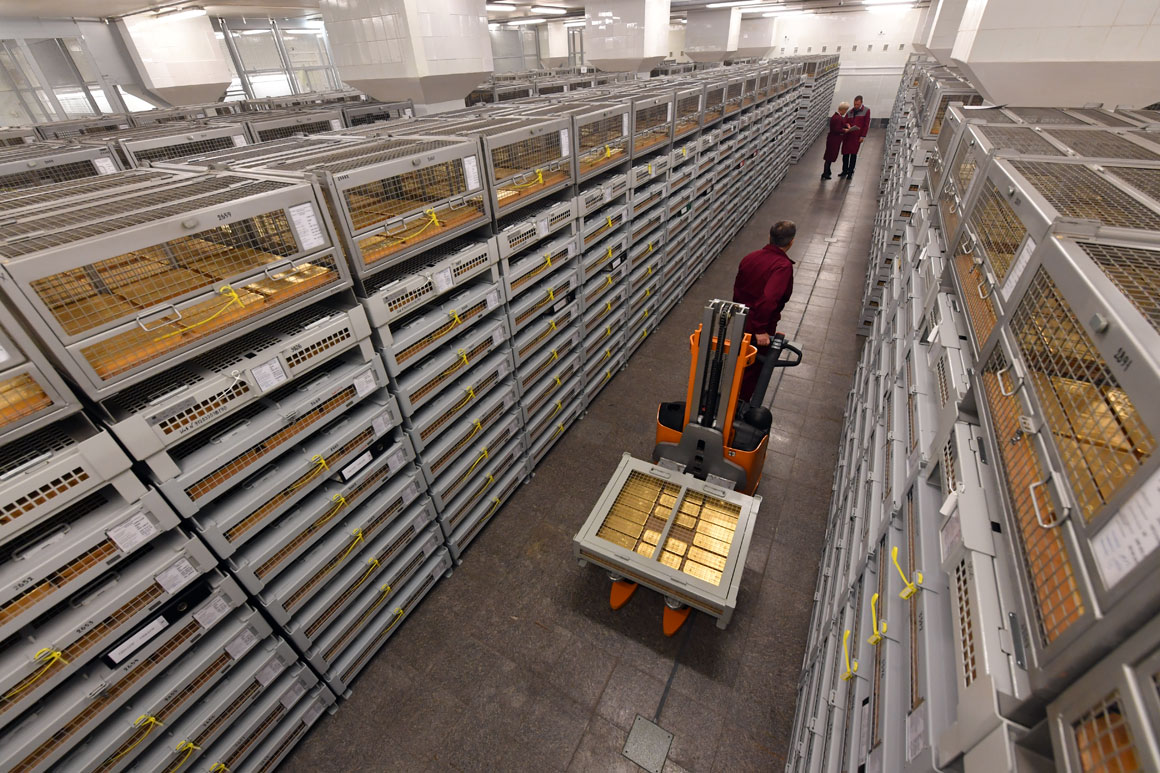
Introducing the ‘Stop Russian GOLD Act’
But something more dramatic also happened on Monday 7 March, a development which looks to have been the catalyst for the LBMA and CME (COMEX) taking action.
This development was the introduction of a Bill to the US Senate on 7 March “to prohibit United States persons from engaging in transactions with foreign persons that purchase or transact in gold from the Russian Federation.”
This Bill is a cross-party (bipartisan) Bill and is sponsored by Senator John Cornyn (Republican, Texas), and co-sponsored by Senator Margaret Wood Hassan (Democrat, New Hampshire), Senator Bill Hagerty (Republican, Tennessee), and Senator Angus S. King Jr (Independent, Maine).
Even though news of this Bill was only announced to the media on Tuesday 8 March, that the Bill was introduced on 7 March and sponsored and co-sponsored on 7 March, is evident by looking at the Congressional entry of this Bill on the US Congress website here, where it states ‘03/07/2022’ in multiple places.
The ‘latest action’ of the Bill is also 7 March and is as follows:
“Latest Action: Senate – 03/07/2022 Read twice and referred to the Committee on Banking, Housing, and Urban Affairs”
Furthermore, the entire text of the Bill can be read on the 7 March entry of the Congressional Record (pages S1018 – 1019) here, including text which brazenly states that ‘This Act may be cited as the ‘‘Stop Russian Government and Oligarchs from Limiting Democracy Act of 2022’’ or the ‘‘Stop Russian GOLD Act’’’
The main part of the Congressional record entry then says:
SEC. 2. PROHIBITION ON TRANSACTIONS WITH FOREIGN PERSONS THAT PURCHASE OR TRANSACT IN RUSSIAN GOLD.
(a) IN GENERAL.—Any transaction by a United States person with a foreign person described in subsection (b) is prohibited.
(b) FOREIGN PERSON DESCRIBED.—A foreign person is described in this subsection if the foreign person—
(1) purchases, transacts in, or transports between countries gold received from the Government of the Russian Federation, including from reserves of the Central Bank of the Russian Federation held outside the Russian Federation; or
(2) engages in a transaction—
(A) involving gold; and
(B) that has a physical or electronic nexus to the Russian Federation.
(c) GUIDANCE.—Not later than 30 days after the date of the enactment of this Act, the Secretary of the Treasury shall publish guidance for United States persons with respect to compliance with this section, including guidance—
(1) to ensure that United States persons are able to avoid unknowingly investing in or transacting with foreign persons described in subsection (b) through bundled or basked assets; and
(2) to facilitate divestment from investment in and transactions with such foreign persons.
(d) IMPLEMENTATION; PENALTIES.—
(1) IMPLEMENTATION.—The President may exercise all authorities provided under sections 203 and 205 of the International Emergency Economic Powers Act (50 U.S.C. 1702 and 1704) to carry out this section. (2) PENALTIES.—A person that violates, attempts to violate, conspires to violate, or causes a violation of this section or any regulation, license, or order issued to carry out this section shall be subject to the penalties set forth in subsections (b) and (c) of section 206 of the International Emergency Economic Powers Act (50 U.S.C. 1705) to the same extent as a person that commits an unlawful act described in subsection (a) of that section.
(e) DEFINITIONS.—In this section: (1) FOREIGN PERSON.—The term ‘‘foreign person’’ means an individual or entity that is not a United States person. (2) UNITED STATES PERSON.—The term ‘‘United States person’’ means— (A) a United States citizen or an alien lawfully admitted for permanent residence to the United States; or (B) an entity organized under the laws of the United States or any jurisdiction within the United States, including a foreign branch of such an entity.
Gold Wars
So now you know why the LBMA and COMEX coordinated the suspension of the LBMA-accredited Russian gold and silver refiners on 7 March. Not because they breached some internal Good Delivery Rules that the LBMA spent 11 days stalling over, but because the US Government has moved to declared war on Russian gold bars.
Hence the coordinated action of the LBMA and CME on the same day as the US Senators entered the “Stop Russian GOLD Act” into the US Congressional Record. This most likely was all coordinated by the US Treasury Office of Foreign Assets Control (OFAC).
And what does this mean for all the Russian gold bars held in the gold-backed ETFs of the world such as the SPDR Gold Trust (GLD) and iShares Gold Trust (IAU)?
After entering their Bill to the Record on 7 March, the 4 US Senators went public on Tuesday 8 March with coordinated press releases such as King’s “To Escalate Russian Sanctions, Senator King Introduces Bipartisan Bill to Freeze Nation’s Gold Reserves”.
This Act , in the senators’ own words:
“would strengthen Russian sanctions by targeting their ability to sell gold reserves.
The bipartisan bill would apply secondary sanctions to any American entities knowingly transacting with or transporting gold from Russia’s central bank holdings or selling gold physically or electronically in Russia, and would create guidance to help Americans avoid these sanctions.”
Why so much fuss over what the Wall Street Journal called a Pet Rock? Unless gold isn’t just Pet Rock. And what ever happened to the USA as the bastion of free capital markets?
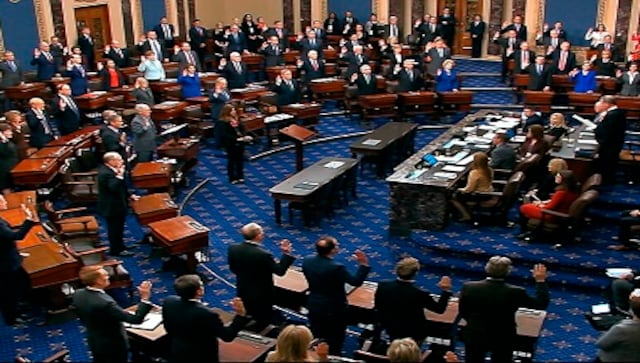
Given the nature of strategic monetary gold reserves, the comments of the four US senators in their press releases sound naïve, and make it abundantly clear that they don’t grasp the attributes of physical gold as the ultimate form of money and ultimate monetary reserve asset, an asset which has no counterparty risk and an asset which Russia has been steadily accumulating (not selling) for the last 17 years, exactly in preparation for what is happening now.
Do the senators also not know that all the Bank of Russia gold is stored domestically in vaults in Moscow, St Petersburg and Yekaterinburg? And that Russia has been accumulating 2300 tonnes of physical gold in its domestic vaults precisely because gold is sanction proof. And that gold is an asset which many sovereigns across the world won’t care if a gold bar has been refined by a Russian refinery or a Swiss refinery or an Australia refinery.
The rest of the Russian gold is stored in St. Petersburg and Yekaterinburg https://t.co/yJUXqeBRfR
— BullionStar (@BullionStar) February 24, 2022
In their press releases, Sen. King thinks that gold can be sanctioned, saying that:
“Russia’s massive gold supply is one of the few remaining assets that Putin can use to keep his country’s economy from falling even further. By sanctioning these reserves, we can further isolate Russia from the world’s economy”.
Senator Hagerty thinks that Russia is selling gold, when in actual fact Russia is actually buying gold. Hagerty says:
“Congress must make it harder for Putin to liquidate Russia’s gold.”
Senator Hassan also gets the buy and sell sides reversed, saying the Bill:
“closes a critical loophole that would allow Russia to sell off its gold reserves to prop up the Russia economy” and that the US must “ensure that we block any escape hatch Putin has in getting around the full weight of our sanctions.”
Sen. Cornyn plays the money laundering card, saying that:
“Russia has taken a page out of Venezuela’s book by exploiting a loophole in current sanctions that allows them to launder money through the purchase and sale of gold”
And that:
“The Russian Federation is purchasing gold to offset the devaluation of its currency, the ruble, and is then selling that gold on international markets in exchange for high-value currency.”
Latest dumb idea from DC is to freeze Russian gold. It’s physical. It’s in Russia. Only way to freeze it is to leave it outside in the winter. You can freeze dollar sale proceeds, but Russia’s a buyer not a seller. They can buy from Russia mines. Can anyone in DC play this game? pic.twitter.com/ArNllWfVMZ
— Jim Rickards (@JamesGRickards) March 8, 2022
Do the US senators also not know that gold does not need to be sold to be mobilised? For it can be used in gold location swaps, gold lending transactions, and as collateral in gold-fiat loans.
According to US political website Axios, the US senators want to get this “Stop Russian GOLD Act” passed and enacted by this coming Friday 11 March. Axios writes:
“The goal is to include the legislation in the omnibus spending bill that lawmakers hope to pass by Friday, an aide familiar with the matter told Axios.”
Incidentally, March 11 is exactly 2 years after the WHO announced the COVID-19 ‘pandemic’ on 3*11 in 2020.
Conclusion
When this “US Stop Russian GOLD Act” is enacted into legislation, it will surely detonate major dislocations in the global monetary system and a ferocious response from Russia.
As Sergey Shvetsov, First Deputy Chairman of Russia’s central bank, commented in November 2017 at the Russian Bullion Market conference in Moscow, and where he explained that Russian gold accumulation is a matter of national security:
“If our gold and foreign currency reserves were ever seized, even if it was just an intention to do so, that would amount to financial terrorism.
It would amount to a declaration of financial war between Russia and the party attempting to seize the assets.”
Which is no doubt why the Kremlin has just come out saying that the US has declared economic war on Russia.
#UPDATE The Kremlin said Wednesday that the US had launched an economic war against Moscow, describing an onslaught of sanctions against the country over its military incursion into its pro-Western neighbour #Ukraine pic.twitter.com/CM0KJ3xIw6
— AFP News Agency (@AFP) March 9, 2022
Which is why also on 7 March, Zoltan Pozsar the guru of global financial infrastructure who works with Credit Suisse, came out with an astounding report titled “Bretton Woods III“, in which he says:
“We are witnessing the birth of Bretton Woods III – a new world (monetary) order centered around commodity-based currencies in the East that will likely weaken the Eurodollar system and also contribute to inflationary forces in the West.
A crisis is unfolding. A crisis of commodities. Commodities are collateral, and collateral is money, and this crisis is about the rising allure of outside money over inside money. Bretton Woods II was built on inside money, and its foundations crumbled a week ago when the G7 seized Russia’s FX reserves…"
And with the US “Stop Russian GOLD Act" now targeting the Russian gold reserves, this has just accelerated Bretton Woods III to a whole new level.
Popular Blog Posts by Ronan Manly
 How Many Silver Bars Are in the LBMA's London Vaults?
How Many Silver Bars Are in the LBMA's London Vaults?
 ECB Gold Stored in 5 Locations, Won't Disclose Gold Bar List
ECB Gold Stored in 5 Locations, Won't Disclose Gold Bar List
 German Government Escalates War On Gold
German Government Escalates War On Gold
 Polish Central Bank Airlifts 8,000 Gold Bars From London
Polish Central Bank Airlifts 8,000 Gold Bars From London
 Quantum Leap as ABN AMRO Questions Gold Price Discovery
Quantum Leap as ABN AMRO Questions Gold Price Discovery
 How Militaries Use Gold Coins as Emergency Money
How Militaries Use Gold Coins as Emergency Money
 JP Morgan's Nowak Charged With Rigging Precious Metals
JP Morgan's Nowak Charged With Rigging Precious Metals
 Hungary Announces 10-Fold Jump in Gold Reserves
Hungary Announces 10-Fold Jump in Gold Reserves
 Planned in Advance by Central Banks: a 2020 System Reset
Planned in Advance by Central Banks: a 2020 System Reset
 China’s Golden Gateway: How the SGE’s Hong Kong Vault will shake up global gold markets
China’s Golden Gateway: How the SGE’s Hong Kong Vault will shake up global gold markets






 Ronan Manly
Ronan Manly 0 Comments
0 Comments







